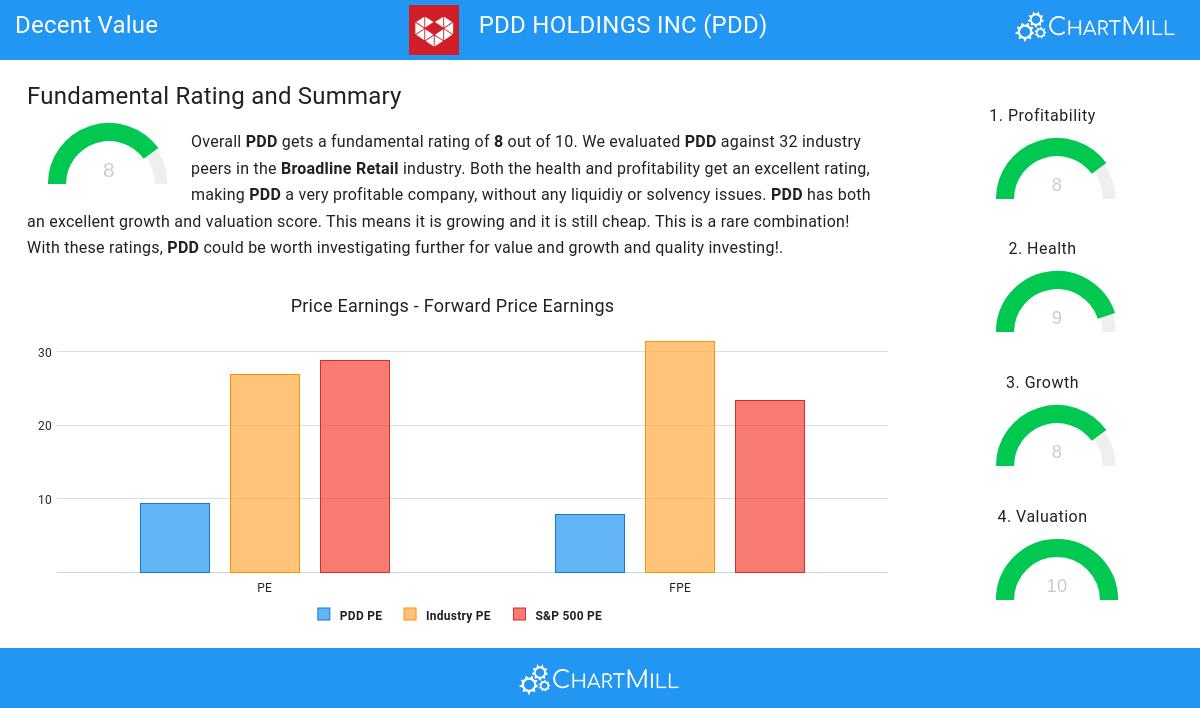When you look at NASDAQ:PDD, it's hard to ignore the strong fundamentals, especially considering its likely undervaluation.
By Mill Chart
Last update: Dec 18, 2024
Uncover the hidden value in PDD HOLDINGS INC (NASDAQ:PDD) as our stock screening tool recommends it as an undervalued choice. NASDAQ:PDD maintains a robust financial position and offers an attractive pricing perspective. Let's dig deeper into the analysis.

Looking at the Valuation
ChartMill provides a Valuation Rating to every stock, ranging from 0 to 10. This rating assesses various valuation aspects, comparing price to earnings and cash flows, while considering factors like profitability and growth. NASDAQ:PDD boasts a 10 out of 10:
- With a Price/Earnings ratio of 9.34, the valuation of PDD can be described as very reasonable.
- Based on the Price/Earnings ratio, PDD is valued cheaply inside the industry as 81.25% of the companies are valued more expensively.
- PDD's Price/Earnings ratio indicates a rather cheap valuation when compared to the S&P500 average which is at 28.77.
- With a Price/Forward Earnings ratio of 7.84, the valuation of PDD can be described as very cheap.
- PDD's Price/Forward Earnings ratio is rather cheap when compared to the industry. PDD is cheaper than 84.38% of the companies in the same industry.
- When comparing the Price/Forward Earnings ratio of PDD to the average of the S&P500 Index (23.38), we can say PDD is valued rather cheaply.
- Based on the Enterprise Value to EBITDA ratio, PDD is valued cheaply inside the industry as 84.38% of the companies are valued more expensively.
- Based on the Price/Free Cash Flow ratio, PDD is valued cheaply inside the industry as 81.25% of the companies are valued more expensively.
- PDD's low PEG Ratio(NY), which compensates the Price/Earnings for growth, indicates a rather cheap valuation of the company.
- PDD has an outstanding profitability rating, which may justify a higher PE ratio.
- PDD's earnings are expected to grow with 35.67% in the coming years. This may justify a more expensive valuation.
Analyzing Profitability Metrics
ChartMill assigns a proprietary Profitability Rating to each stock. The score is computed by evaluating various profitability ratios and margins and ranges from 0 to 10. NASDAQ:PDD was assigned a score of 8 for profitability:
- PDD has a Return On Assets of 23.19%. This is amongst the best in the industry. PDD outperforms 100.00% of its industry peers.
- With an excellent Return On Equity value of 38.87%, PDD belongs to the best of the industry, outperforming 93.75% of the companies in the same industry.
- PDD has a better Return On Invested Capital (31.27%) than 100.00% of its industry peers.
- PDD had an Average Return On Invested Capital over the past 3 years of 17.97%. This is significantly above the industry average of 11.71%.
- The 3 year average ROIC (17.97%) for PDD is below the current ROIC(31.27%), indicating increased profibility in the last year.
- PDD has a Profit Margin of 29.10%. This is amongst the best in the industry. PDD outperforms 100.00% of its industry peers.
- PDD has a Operating Margin of 28.28%. This is amongst the best in the industry. PDD outperforms 100.00% of its industry peers.
- The Gross Margin of PDD (62.06%) is better than 84.38% of its industry peers.
What does the Health looks like for NASDAQ:PDD
To gauge a stock's financial health, ChartMill utilizes a Health Rating on a scale of 0 to 10. This comprehensive evaluation encompasses liquidity and solvency, both in absolute terms and in comparison to industry peers. NASDAQ:PDD has earned a 9 out of 10:
- PDD has an Altman-Z score of 5.85. This indicates that PDD is financially healthy and has little risk of bankruptcy at the moment.
- PDD has a Altman-Z score of 5.85. This is amongst the best in the industry. PDD outperforms 81.25% of its industry peers.
- PDD has a debt to FCF ratio of 0.04. This is a very positive value and a sign of high solvency as it would only need 0.04 years to pay back of all of its debts.
- The Debt to FCF ratio of PDD (0.04) is better than 93.75% of its industry peers.
- A Debt/Equity ratio of 0.02 indicates that PDD is not too dependend on debt financing.
- PDD has a better Debt to Equity ratio (0.02) than 78.13% of its industry peers.
- PDD has a Current Ratio of 2.15. This indicates that PDD is financially healthy and has no problem in meeting its short term obligations.
- PDD's Current ratio of 2.15 is fine compared to the rest of the industry. PDD outperforms 68.75% of its industry peers.
- A Quick Ratio of 2.15 indicates that PDD has no problem at all paying its short term obligations.
- PDD has a better Quick ratio (2.15) than 81.25% of its industry peers.
Unpacking NASDAQ:PDD's Growth Rating
ChartMill assigns a Growth Rating to every stock. This score ranges from 0 to 10 and evaluates the different growth aspects like EPS and Revenue, both in the past as in the future. NASDAQ:PDD scores a 8 out of 10:
- The Earnings Per Share has grown by an impressive 113.90% over the past year.
- PDD shows a strong growth in Revenue. In the last year, the Revenue has grown by 87.39%.
- The Revenue has been growing by 79.96% on average over the past years. This is a very strong growth!
- Based on estimates for the next years, PDD will show a very strong growth in Earnings Per Share. The EPS will grow by 23.38% on average per year.
- Based on estimates for the next years, PDD will show a very strong growth in Revenue. The Revenue will grow by 27.10% on average per year.
Our Decent Value screener lists more Decent Value stocks and is updated daily.
Our latest full fundamental report of PDD contains the most current fundamental analsysis.
Keep in mind
Important Note: The content of this article is not intended as trading advice. It is essential to perform your own analysis and exercise caution when making trading decisions. The article presents observations created by automated analysis but does not guarantee any trading or investment outcomes. Always trade responsibly and make independent judgments.
105
-4.02 (-3.69%)
Find more stocks in the Stock Screener
PDD Latest News and Analysis



